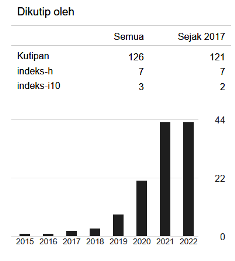PELATIHAN DIGITALISASI PADA DESA WISATA LOMBOK INDONESIA
Abstract
Keywords
Full Text:
PDFReferences
Aboderin, O. S. (2015). Challenges and prospects of E-learning at the National Open University of Nigeria. Journal of Education and Learning, 9(3), 207-216.
Arokiasamy, L., & Ismail, M. (2009). The background and challenges faced by the small medium enterprises. A human resource development perspective. International Journal of business and Management, 4(10), P95.
Cereijo, M. V. P. (2006). Attitude as predictor of success in online training. International Journal on E-Learning, 5(4), 623-639.
Goodwin, H., & Santili, R. (2009). Community-based Tourism. ICRT Occasional Paper 11.
Hermansah. (2020, 20 Agustus). Strategi bertahan bagi UMKM hadapi akibat krisis Covid 19. Diakses pada 20 Agustus 2020 dari https://www.alinea.id/bisnis/strategi-bertahan-bagi-ukm-hadapi-krisis-akibat-covid-19
Hew, K. F., & Cheung, W. S. (2014). Students’ and instructors’ use of massive open online courses (MOOCs): Motivations and challenges. Educational research review, 12, 45-58.
Irianto, J. (2001). Prinsip-prinsip dasar manajemen pelatihan. Surabaya: Insan Cendekia.
Jordan, K. (2014). Initial trends in enrolment and completion of massive open online courses. International Review of Research in Open and Distributed Learning, 15(1), 133-160.
Kemenparekraf. Rencana Strategis 2020-2024. www. kemenparekraf.go.id
Margaryan, A., Bianco, M., & Littlejohn, A. (2015). Instructional quality of massive open online courses (MOOCs). Computers & Education, 80, 77-83.
Martin, F. G. (2012). Will massive open online courses change how we teach?. Communications of the ACM, 55(8), 26-28.
Okazaki, E. (2008). A community-based tourism model: Its conception and use. Journal of sustainable tourism, 16(5), 511-529.
Papadopoulos, T., Baltas, K. N., & Balta, M. E. (2020). The use of digital technologies by small and medium enterprises during COVID-19: Implications for theory and practice. International Journal of Information Management, 55, 102192.
Rahmi, V. A., Ismanto, H., & Fathoni, M. Z. (2020). Inovatif Saat Pandemi Covid Melalui Pelatihan Kewirausahaan Khas Perempuan Berbahan Sampah “Kolaborasi BUMDes dan Warga”. Dinamisia: Jurnal Pengabdian Kepada Masyarakat, 4(3), 418-425.
Sanghi, S. (2016). The handbook of competency mapping: understanding, designing and implementing competency models in organizations. SAGE publications India.
Suansri, P. (2003). Community Tourism Management Manual. Bangkok: Tourism for Life and Nature.
Susilawati, E. (2018). Dampak Program Diklat Online Tik Guru Pustekkom Terhadap Aksesbilitas Konten Pembelajaran Pada Fitur Rumah Belajar. Jurnal Pendidikan, 19(2), 84-103.
Strielkowski, W., Abrhám, J., & Herget, J. (2014). Success factors of growth and development for small and medium enterprises in tourism sector. Journal of Applied Economic Sciences, 9(27), 101-109.
Nurcahyadi, G. (2020, 22 September). UMKM Perlu Tambah Pengetahuan Bisnis agar Bertahan di Masa Pandemi. Diakses pada 12 Januari 2021 dari https://mediaindonesia.com/ekonomi/346925/umkm-perlu-tambah-pengetahuan-bisnis-agar-bertahan-di-masa-pandemihttps://mediaindonesia.com/ekonomi/346925/umkm-perlu-tambah-pengetahuan-bisnis-agar-bertahan-di-masa-pandemi
Qiu, R. T., Park, J., Li, S., & Song, H. (2020). Social costs of tourism during the COVID-19 pandemic. Annals of Tourism Research, 84, 102994.
Ratnasingam, J., Khoo, A., Jegathesan, N., Wei, L. C., Abd Latib, H., Thanasegaran, G., ... & Amir, M. A. (2020). How are small and medium enterprises in Malaysia’s furniture industry coping with COVID-19 pandemic? Early evidences from a survey and recommendations for policymakers. BioResources, 15(3), 5951-5964.
Wardah. (2021, 10 januari). Sektor UMKM paling terdampak Covid. Diakses pada 10 Januari 2021 dari https://www.voaindonesia.com/a/sektor-umkm-paling-terdampak-covid-19/5523330.html
Refbacks
- There are currently no refbacks.
Copyright (c) 2022 Fetty Poerwita Sary, Dian Indiyati, Milleniartha Moslem

This work is licensed under a Creative Commons Attribution-ShareAlike 4.0 International License.

This work is licensed under a Creative Commons Attribution-ShareAlike 4.0 International License
Turast: Jurnal Penelitian dan Pengabdian
Lembaga Penelitian dan Pengabdian (LPPM), Gedung Rektorat Lantai I
Kampus III Universitas Islam Negeri Imam Bonjol Padang - All rights reserved
Email: turast@uinib.ac.id




